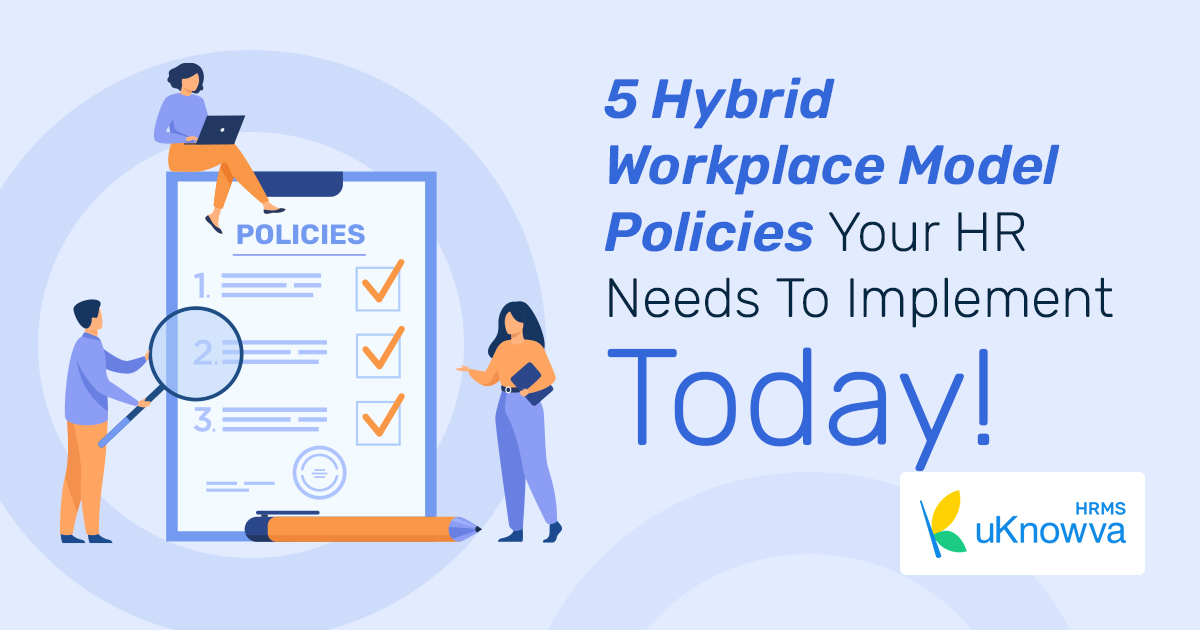Table of Content
Introduction
Implementing a hybrid workplace model ensures a productive, balanced, and inclusive atmosphere.
Employees in a hybrid work setup usually have more autonomy, which leads to a rise in their engagement and satisfaction.
For employers, the hybrid model helps foster a more productive, healthy, and stable workforce. However, implementing a successful hybrid workplace is not straightforward and requires a strategic approach.
Modern HR technologies play an integrated role in building connections, supporting collaboration, and enhancing employee engagement in this model.
HR teams must create policies that address the unique needs of a hybrid model, enabling employees to work effectively both remotely and on-site.

5 Critical Hybrid Workplace Model Policies to Implement
-
Flexible Work Schedules
A flexible schedule policy is essential to support employees in managing their time effectively across different locations.
HR should establish guidelines that allow employees to choose their working hours within certain limits while ensuring team alignment and availability during core hours.
Flexibility boosts morale, work-life balance, and productivity, enabling employees to work when they are most effective.
-
Clear Communication & Collaboration Guidelines
Strong communication policies are key to maintaining team cohesion and preventing silos in a hybrid workplace module.
Establish guidelines on communication tools like uKnowva’s Social Intranet and outline expectations for regular check-ins, status updates, and project tracking.
With a communal, and easily or anywhere-accessible social intranet. Employees are just a tap or click away from their seniors, supervisors, HR, or team members.
It leaves no room for doubt to communicate without hassle for employees. So the expectations and conflicts are met seamlessly even for hybrid employees.
-
Remote Work Equipment & Safety Standards
To ensure a safe and productive hybrid workplace model, provide clear guidelines for the equipment and safety standards required for remote work.
Policies published on your dedicated uKnowva HRMS portals should address reimbursement procedures for necessary equipment like laptops, ergonomic chairs, and monitors.
It’s also essential to set safety standards for home office setups to reduce potential physical strain and support employee wellness.
-
Data Security & Privacy Protocols
Hybrid workplace model introduces unique security challenges, with employees accessing company data from various locations and devices.
HR needs to implement robust data security policies, including secure VPN access, two-factor authentication, and password management practices.
Employees should be educated on best practices to prevent data breaches, including training on recognising phishing attempts and securely handling confidential information.
-
Inclusivity and Fair Treatment Measures
Ensuring an inclusive workplace where both remote and on-site employees feel valued and have equal opportunities is vital.
Policies should address fair treatment in performance evaluations, promotions, and team dynamics.
HR teams should implement measures to minimise or reduce unconscious bias, fostering a truly equitable hybrid workplace.
Implementing with uKnowva HRMS
Using uKnowva HRMS can help manage these policies effectively by providing centralised access to company guidelines, a communication portal, and tools for tracking employee engagement and performance in real time.
With uKnowva HRMS, HR teams can monitor compliance with hybrid policies and gather feedback to improve the employee experience continuously.
These policies help create a cohesive, secure, and productive hybrid workplace that meets the needs of today’s dynamic workforce.
Conclusion
To promote a hybrid workplace model, we need the latest workplace policies to ensure smooth functioning within the organisation.
Be it in-office employees or hybrid, inclusive policies ensure that the employees are satisfied and engaged at every click or interaction.
uKnowva HRMS makes it possible with less effort. Its endless features engage employees, auto-update the system as new policies roll out, and resolve the issues of employees effectively.
FAQs on Hybrid Workplace Model Policies
- How do hybrid workplace policies support work-life balance?
Hybrid workplace model policies are designed to give employees flexibility over where and sometimes when they work. By reducing daily commutes and allowing for remote work, employees have more time to focus on personal responsibilities, promoting a healthier work-life balance.
- What are the best practices for ensuring equal opportunities for remote and in-office employees?
To ensure fairness, companies can establish clear communication guidelines, use performance metrics based on outcomes, and organise regular check-ins.












